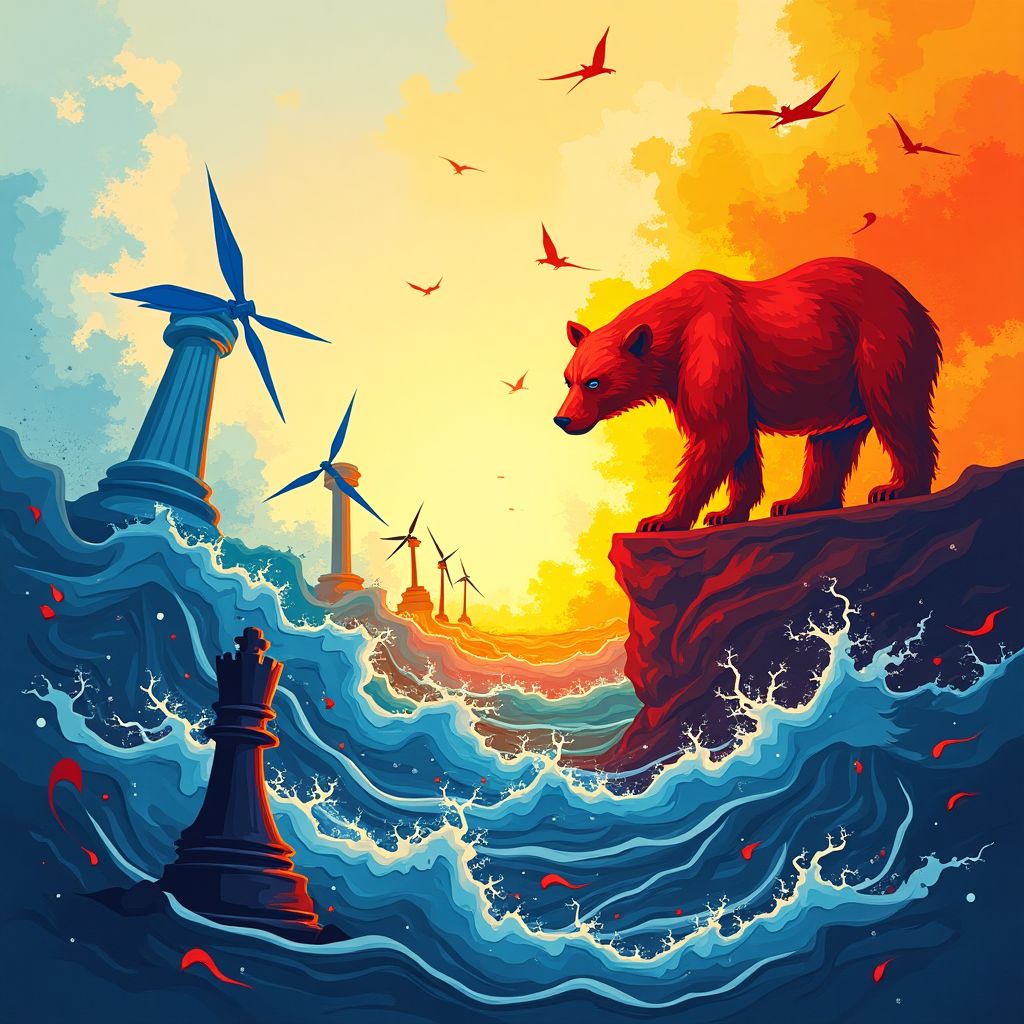When the winds of change blow, some build walls while others build windmills. – Chinese Proverb.
In the current geopolitical landscape, Russia's struggles appear like a tempest as they navigate the tumultuous seas of military conflict, economic woes, and demographic decline. The saying is a poignant metaphor for how nations respond to crises. Russia, embroiled in the Ukraine war and experiencing declining global influence, highlights a pivotal question: Will they build walls to isolate themselves or harness the winds of change to forge a new path?
This article, inspired by a thought-provoking video by Zeihan on Geopolitics, delves into why Russia, despite its military and geopolitical setbacks, remains a crucial focal point for the world. Peter Zeihan takes us on a geopolitical expedition, unraveling the enigma that is Russia today. So, buckle up as we journey through the complexities of Russia’s current crisis, examining military, economic, and demographic dynamics in a world teetering on the edge of change.
Is Russia Down for the Count?
In his latest entry from the picturesque Matukituki Valley of New Zealand, Peter Zeihan addresses the question on everyone’s mind: If the Russian military is underperforming, why worry about what happens post-Ukraine war? It’s a query that holds more weight than a gym-addicted sumo wrestler, but allows Zeihan to juxtapose the current Russian challenges against larger strategic concerns.
For starters, this war is far from its final curtain call. To date, Russia hasn’t experienced a general mobilization nor made the quintessential shift to a full war economy. Imagine they're a car, and we've yet to see them change gears fully. The chance of outside powers like China coming to Russia's aid, ignoring potential sanctions, adds an even greater complexity to this geopolitical chess game.
Reason One: The Chessboard is Still Set
The assertion that Russia still possesses unexploited potential is nothing short of unsettling. A full mobilization could alter the current dynamics drastically, and outside influences are wild cards yet to be played. Ukraine might have over-delivered in performance, emerging a heroic underdog in a modern-day David vs. Goliath narrative. But just as carnage in a blockbuster doesn’t spell the end credits, neither does military might alone decide crises of this scale.
Reason Two: The Nuclear Paradox
Flash forward a few tense years—it’s conceivable that Russia rolls up to the NATO border, emboldened. Brace yourselves for a plot twist worthy of a Tom Clancy novel: the nuke card. Underestimating Russia’s strategic psyche could result in scenarios where fear takes precedence. Here’s a chilling potentiality: Russia threatens Western capitals with nuclear annihilation unless support is withdrawn from neighboring NATO states. The mere idea can give even the most robust diplomat goosebumps.
The Third, Looming Shadow: Demographic Doom
Russia's demographic decline might seem like Mother Nature’s version of a retirement plan, but it signifies much more. With an aging population, Russia faces a "now or never" epoch. The Russian ethnicity is seeing what might be its final century at prominence. A nation desperate and aware of its mortality is capable of unpredictable actions. It’s a narrative of desperation, fate, and poker faces. Like a phoenix navigating the flames or a gambler with nothing to lose, Russia’s path remains unpredictable.
Struggles of Waging War
Russia’s trials extend beyond mere military exertion. Economically, they're engaged in a precarious juggling act, where resources, not unlike a circus performer’s flaming torches, keep demanding more skill and creativity to handle without getting burned. The same dynamics encapsulate their economic sanctions and resource depletion.
Understanding the Greater Implications
The takeaway here is that every day Ukraine withstands Russia’s advances is a triumph against potentially dire outcomes. For the West, supporting Ukraine isn't just about defense but protecting a strategic linchpin in a precariously stacked card tower of global political stability.
Is the Future Unwritten or Written off?
In these sprawling geopolitical narratives, punctuated with missiles, politics, and threats, what role do hope and collaboration play? With each passing day, the scenarios may drift further from desolate outcomes. Constructing a future might appear daunting, but unity and strategic foresight can build not walls but windmills.
How do you see the unfolding Russian crisis? Is this a defensive struggle, a chess game, or just the beginning of a more complex geopolitical tapestry? Share your insights and become part of the iNthacity community. Join us at the "Shining City on the Web" to share, debate, and dream a brighter tomorrow.
Wait! There's more...check out our fascinating short story that continues the journey: The Precipice of Resistance
Disclaimer: This article may contain affiliate links. If you click on these links and make a purchase, we may receive a commission at no additional cost to you. Our recommendations and reviews are always independent and objective, aiming to provide you with the best information and resources.
Get Exclusive Stories, Photos, Art & Offers - Subscribe Today!

























Post Comment
You must be logged in to post a comment.